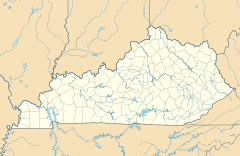Riceville, Fulton County, Kentucky facts for kids
Quick facts for kids
Riceville, Kentucky
|
|
|---|---|
| Country | United States |
| State | Kentucky |
| County | Fulton |
| Elevation | 400 ft (100 m) |
| Time zone | UTC-6 (Central (CST)) |
| • Summer (DST) | UTC-5 (CST) |
| GNIS feature ID | 501782 |
Riceville is a small place located in Fulton County, Kentucky, in the United States. It is known as an unincorporated community. This means it's a group of homes or businesses that isn't officially part of a city or town. Instead, it's governed by the larger county it's in.
Contents
What is an Unincorporated Community?
An unincorporated community is a place where people live close together, but it doesn't have its own local government like a city or town does. It doesn't have a mayor or a city council.
How They Are Governed
- Instead of having its own city rules, an unincorporated community follows the rules of the county it's located in.
- The county government provides services like police, fire protection, and road maintenance.
- People living in these areas still pay taxes to the county and state.
Why Some Places Are Unincorporated
- Sometimes, a community might be too small to form its own city government.
- Other times, residents might prefer to be governed by the county. This can sometimes mean fewer local taxes or different rules.
Where is Riceville Located?
Riceville is found in the southwestern part of Kentucky. Kentucky is a state in the southeastern United States.
Fulton County, Kentucky
- Riceville is specifically located in Fulton County.
- Fulton County is the westernmost county in Kentucky.
- It borders the state of Tennessee to the south and Missouri to the west.
Geography and Elevation
- Riceville is about 400 feet (122 meters) above sea level. This is its elevation, or how high it is compared to the ocean.
- The area around Riceville is mostly flat, which is common for this part of Kentucky.
History of Riceville
While specific details about Riceville's early history are not widely recorded, many unincorporated communities like it grew from small settlements. They often started around a general store, a church, or a school that served local farmers and families. These communities played an important role in connecting people in rural areas.
 | Delilah Pierce |
 | Gordon Parks |
 | Augusta Savage |
 | Charles Ethan Porter |



